- Home
- William Kennedy
The Ink Truck Page 17
The Ink Truck Read online
Page 17
“Am I a whore, Bailey? A nymph? An easy make? Tell me the truth, is it wrong to like it?”
The question was melancholy, also provocative, and Bailey moved his free hand toward her right one, working both in the quasi-circular motion that he remembered soldiers calling tuning-in-Berlin during the war years. Irma smiled through wondering eyes.
“Lovely cupcake,” Bailey said.
“I’m no cupcake. Some men liked me for my mind. Did you know that?”
Bailey worked in silence, and the question passed.
“Am I opening Pandora’s box a little wider every time? What’s next for me? A do-it-yourself kit?”
“Maybe,” he said. “But that’s a long way down the ladder.”
“Hold me up, Bailey. Every way.”
They stood and kissed, and Bailey thought: Time to crank up the machinery. He raised her skirt while he kissed her, but then broke away. Bailey wants full view of one of his great pleasures—Irma’s body being freed of its covers. Her great globy breasts, sweet cushions, pushed out of her brassiere as he lifted her sweater over her head. She unhooked her skirt and stepped out of it daintily, then tugged at his zipper. She whipped it out then and pounced on it, smothering it with kisses like a new arrival at a family reunion. Bailey let her work for a few minutes, then stood her up and pulled down her half-slip, which was tattered at the edges, its lace crumbling from too many washings.
“Couldn’t that undertaker afford to buy you a new slip?”
“He never saw anything but the outer layer. I told you he was a dud. He liked to do it in the dark.”
“Maybe he liked to think of you as a corpse.”
“That’s a rotten thing to say. I wonder why I never thought of it.”
Bailey was squatted down, untangling her slip from her high heels when she grabbed the back of his head and pulled his face into her garter belt.
“Hurry,” she said. “Hurry.”
He stood and undid her bra, and her bulby diamonds took their natural position, obscuring the rest of the world.
“Nibble one, nibble two. Upsy, upsy.”
“Get on with it,” Irma advised, and at that moment she succeeded in undoing belt and top button, making him suddenly trouserless, then shortsless. Then she was back at him, dealing with his varied crevices.
“You won’t let me at it,” he told her.
She stood up then, still holding on. He looped her out of her pants and gained access at last, her charcoal-gray stockings and garter belt with its faded flowers remaining in place.
“Would it mean anything to you,” she asked, “if I said I loved you with all my heart?”
“It’d mean something,” he said, sending a finger in search of her magic button.
“It’d be true,” she said, beginning to undulate.
“Would it also be true for any members of your nostalgia squad?”
“I don’t think so. Not anymore.”
“You don’t think so.”
“Eeeeeeeaaagh. That’s right.”
“Did anybody ever tell you what a fickle woman you are?”
“Sometimes I think nobody was really made for monogamy.”
“Ooo-ooo there,” Bailey said. “Careful.”
“Bite me, Bailey. Long and easy.”
“Bite you?”
“However it’s done. I always wanted to see what it was like.”
“And nobody ever did it for you?”
“I never asked.”
Bailey did what he could.
“How’s that?” he inquired.
“More.”
No more, Bailey thought. Continence is no longer my strong suit. He whipped her heavy coat off the book rack and doubled it on top of a wagon loaded with philosophy books to be shelved. He pillowed her head with her skirt, and he laid her down on the wagon. Then, climbing to the second shelf of a stack in one aisle to gain proper angulation, he split the loveliest breach he’d ever known.
“Yaggghhh,” she said, and then she started the cart moving, kicking off from whichever shelf her foot touched. They zigzagged past Plato and Aristotle, Spinoza and Descartes, Schopenhauer and Sartre, and Bailey’s last vision was of Emerson, the transcendentalist.
“I don’t give a goddamn what you think, Bailey. I love you with everything. Heart, soul and cunny.”
Bailey could not say whether it was the sentiment, the antique word or merely the action, but something triggered the machine and his great bolt of love syrup carried Irma’s abjectly honest profession of love back into herself with quick, sweet requitement.
“Now the pain is gone,” she said.
“Irma,” Bailey said, “I love you dearly. And it keeps getting different.”
They smooched then, Bailey reveling in his discovery, Irma in her ease. A nice day at last, Bailey thought. A day without losers.
Things seemed unfinished to Bailey when he came up from the stacks. He walked in the daylight of the cold and clear late afternoon, full of odd compulsions that no longer seemed to have anything to do with the Guild, the strike, the company. He felt no rancor toward company people or gypsies. Outrage had faded. Revenge had no foothold in him. He had revenged himself so many times, always uselessly. It was another power ploy: eye for eye, wound for wound. I am greater. I have the final say. I. That was always the crucial turn. Follow that path and you slid to the center of the maze where the all-devouring monster waited with open jaws. And he had beaten that monster. He was done with useless argument.
Yet the compulsion to act remained, for everything in the clarity of daylight seemed unfinished. Seeing Skin, for one. The image of Skin crying at Miss Blue’s after his failure as a subversive nagged Bailey. A man with that kind of intensity might be worth saving. Possibly he was mad, or neurotically addicted to self-defeating games. But his striving seemed genuine, and Bailey felt kinship with any debauchery of the spirit after intense failure: grotesque self-indulgence until the cloud passes.
He knew only the general neighborhood where Skin’s apartment was located: a slum. He approached it at the close of the workday, stores and offices letting out, the slum trade just beginning. White men in cars circulated through the largely Negro neighborhood, questing for cocktail-hour poon. Bailey quizzed bartenders and store clerks about Skin but learned nothing. But he found the block and after several tries found also the hallway where he’d fallen among Skin’s garbage. He knocked and Stephanie answered and stared at him, not sullen, not hostile, only blank.
“I’m looking for Skin.”
“He’s not here.”
“Is he around? In the neighborhood?”
“Who wants to know?”
“I’m Bailey. Don’t you remember?”
“No.”
“I was here the night of the fire. We talked. You asked if I wanted to fickydick.”
“Why don’t you just say plain what you want. Come on.”
“No, I want to see Skin.”
“He’s not here no more.”
“Isn’t he in town?”
“What do you want with Skin? Who are you, mister?”
“How could you forget me? I was tied up with wire, right in your apartment.”
“Lotsa people been in my apartment. I just ain’t about to remember ’em all.”
“Forget that, then. Where’s Skin?”
“He’s dead. Just dead.”
“Dead.”
“Hung himself.”
“Agggh.”
“Tied a rope around the radiator and hung himself out the window. Little kids found him, the wind just blowin’ him easy. Just easy.”
Bailey shook his head.
“Look, you comin’ in or not? I got no time for yakety strangers.”
“No,” Bailey said. “I won’t be coming in.” He remembered she cleaned his fingers in the barn, that he called her an angel. Now she looked at him with dead eyes and a slack mouth, and Bailey thought: another one of the very suddenly dead.
“Cheep-cheep,” she said
in a bird squeak, and closed the door.
Bailey took a bus uptown to where Deek lived and found him alone in the living room watching a quiz show on television. Deek hobbled to the door to let Bailey in, then hobbled back and elevated his plaster-cast on a footstool.
“Another couple of weeks I’ll be rid of this.”
“I should have come to see you before,” Bailey said, “but things went crazy.”
“Sure. I know how it is.”
“I understand they put you in for honorary membership.”
“So I hear. That was nice of them.”
“You took a beating for the Guild. That was courageous.”
“I didn’t know what I was doing.”
“Very few heroes ever have. Those who survive get medals.”
“I’m out of it now.”
“Out?”
“The Guild really isn’t my cup of tea. It’s too vague for me. I’ve taken a fancy to writing for television. Lot of money in commercials. Maybe learn something about movies. Plenty of action in the movies these days.”
“Ah.”
“You’re not pleased.”
“Pleased, not pleased, that’s not my place.”
“You know what the Bible says,” Deek said, avoiding Bailey’s eyes. “Many are called but few are chosen.”
“I never bought that,” Bailey said.
“You never bought it?”
“Anyway, I hope you get well soon.”
“Young bones knit fast, the doctor said.”
“Variously,” Bailey said, and he went out the door leaving a half-formed word in Deek’s mouth. As he went down the steps Bailey heard the clomp of Deek’s plaster-legged hobble, and from the doorway the young man cried out: “Who the hell are you, anyway?”
He knew something had changed when his Aunt Rose answered the bell and looked at him with an odd grin that had no mirth in it.
“What happened?”
“He’s in bed. He’s been there six days now. Doesn’t say a word.”
“He’s not sick?”
“He eats a little but he won’t get out of bed. The cat came too, only I didn’t dare tell him. It came in the mail, wrapped in a plastic bag and in just awful shape.”
“Are you sure it was the same cat?”
“I’d know that cat anywhere, even if it was just bones.”
“What’d you do with it?”
“I burned it. You don’t suppose I’d leave it around for him to see.”
Bailey went upstairs to his uncle’s room. He found the old man lying on his side, looking out the window at the cold, gray day. He had a vision of him sitting upright in the coffin, like a cat might.
“Hello, Cappy. I just came by to see how things were going.”
The old man said nothing. Bailey sat down and looked at his face without speaking. His aunt was right. The face betrayed no illness, just grief. Bailey had no intention of trying to talk him out of his grief. He just watched, silently, for twenty minutes while the old man stared out the window. Then he patted him on the shoulder and left.
Now life had a flat quality about it as he walked the streets. The evening was coming on, its darkness blotting out sectors of what was real. Buildings fell into mutilating shadows, streets divided into the abysses of dark and light. Nothing was right, not his uncle, not Deek; and Skin dead of malevolent profundity. Bailey had no wish to bring life down to an either/or principle: join or die. But all pressures indicated that direction. The problem was that there was no longer anything to join. Except Irma’s flesh. Starvation diet of love-alone. He called Rosenthal and found the phone disconnected. He walked to the Guild room and found it locked. He tried his key, discovered the lock had been changed, peered through the window at his chair. Someone had moved it, newspapers a foot deep on its seat. He called Irma.
“I’ve been looking all over hell for you,” she told him. “You didn’t say you were leaving the library early.”
“The Guild room is locked.”
“Don’t you think I know it? I’m sure that’s Popkin’s work.”
“Where did Jarvis go?”
“He’s home. I called him but he said he couldn’t talk and hung up. He’s addled, the poor simp.”
“We’ll go see him.”
When he reached the corner by Jarvis’ house Irma was waiting, her hands in a muff he’d never known her to carry. What he felt toward her made him feel comfortable at last on this bleak day. He wanted to go over all the absurd things they’d all gone through, separately or together, and explain that they had no explanation, that they were fixed in time and space and stood only for whatever meaning he, or anyone else, cared to give them. It seemed like a wonderful notion to explore with someone who could understand; and it seemed like a palliative truth that conclusively proved the falsity of all paranoid philosophies. Paranoiacs would be instantly converted to peace by this truth. It seemed the very edge of titanic revelation, and it exhilarated Bailey. But then the ideas began to cloud over. Possibly it was not revelation. Possibly it was just another lie or another delusion and means that we’re dead. Or that we have become sterile. Or mutants. The consummation of a wish: dream sundered, hope exploded. Another kind of death.
Irma pulled one hand out of the muff and let him look inside. In her other hand, the muff hiding it, she held an antique pistol.
“Take it,” she told him.
“For what?”
“It’s my grandfather’s old railroad pistol. He gave it to me and Francie when he died so we’d have some protection.”
“I don’t want it.”
“Listen. Something’s definitely wrong. I called Jarvis back and he said not to come over, that it wouldn’t be wise. But he wouldn’t say what it meant and he sounded spooky. So take the pistol.”
“But I don’t want to shoot Jarvis or anybody else either.”
“What if somebody shoots at you? What’ve you got, a sheet-metal chest?”
Bailey smiled and guided Irma’s hand back into her muff. The streetlights came on and Bailey smiled. As they walked up the steps of Jarvis’ house, scar tissue grew on Bailey’s sores. He clenched his fist, opened it, clenched it again. In the bright light on Jarvis’ porch he squeezed the tendons in his wrist, felt the pulse of his own life. His action seemed vital, then willfully symbolic, then comic. He laughed at this.
“What’s the joke?” Irma asked.
Unable to answer, Bailey brought his laughter to a logical conclusion.
Jarvis and his dog greeted them. Jarvis wore a yellow shirt with sleeves rolled below the elbows, meticulously creased black trousers and highly polished black shoes with pointed toes and Cuban heels. Bailey noticed that the black wart on Jarvis’ chin had been camouflaged with a round nickel-sized bandage and his hair slicked with tonic that gave an alcoholically sweet smell.
“I see you’re all sharped up,” Bailey said.
“Popkin said we were all slobs. What do you want from me?”
“We wondered where you went.”
“I’m here. Here at home. Any more questions?” He held the door ajar, but not enough for it to be an invitation to enter.
“Where is old Popkin?”
“Around somewhere. Here and there.”
“Why is the Guild room locked?” Irma asked.
“Who wants to know? What is this, the third degree?”
“Why is it locked, Jarvis?” Bailey said flatly.
“Popkin said we deserved a rest. He’ll open it when he comes back from wherever he went.”
“Do you believe that?”
“I believe what I’m told.”
“What if I told you I’d smash your skull open and scoop out your brains for bird food unless you told us the truth? Would you believe that?”
“I can see you’re on edge,” Jarvis said. He opened the door for them. “Let me take your coats.”
Jarvis’ dog, a dalmatian, sat down when Jarvis carried the coats to a hall closet. But then the dog yelped and stood u
p. He tried to sit, yelped again and remained standing.
“That’s what my wife and her gang did to him. His testicles are all swollen. And that really hurts.”
Jarvis led them to his basement playroom and directed Bailey to a low rocker. He sat himself on a high barstool and suggested Irma sit in a far corner and keep out of the conversation. Irma shrugged and kept her hands inside her muff. Jarvis leaped off the barstool and made the drinks.
“Why didn’t you want us to come here?” Bailey asked him.
“I’m glad you came. Glad.”
“Is that so? You seem unusually nervous.”
“Having visitors does that.”
“You have a lot of visitors?”
“Sometimes my wife comes by for a towel. But you’ve never been here. You really don’t know me at all.”
“I suppose it’s possible to think of it that way.”
“It’s silly to think you know somebody you just work with.”
“Sometimes the part illuminates the whole.”
“You intellectual bastards always think you’re so goddamn smart.”
“That’s not very civil, Jarvis.”
“You snotty sonsabitches think you can drive me crazy.”
The dalmatian yelped, rose, sat, yelped again. Jarvis passed out the drinks in silence, then sat down. Bailey sipped his drink, which was heavy on the Scotch.
“How ya doin’?” Jarvis asked, smiling. “How’s it been goin’?”
“Oddly,” said Bailey.
“Here’s to it,” Jarvis said, raising his glass. “To all of us.”
When Irma and Bailey didn’t toast, Jarvis looked hurt.
“You don’t like my whiskey?”
Bailey sipped it and shrugged.
“What I want to know is what happened to the Guild room.”
“Here’s to happy times,” Jarvis said. “Happy, happy.”
“What are you hiding, Jarvis?”
“I’m not a bad guy. But I get terrible headaches. I always got them, but lately they’re worse.”
“You should see a doctor. A neurologist or a neurosurgeon.”
“Don’t tell me what to do.” He stood up, furious. “You smart babies know the names of all the specialists. A good old family doctor is good enough for me.”
“You’re too touchy to talk to,” Bailey said, standing up.

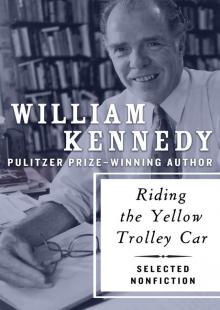 Riding the Yellow Trolley Car: Selected Nonfiction
Riding the Yellow Trolley Car: Selected Nonfiction Changó's Beads and Two-Tone Shoes
Changó's Beads and Two-Tone Shoes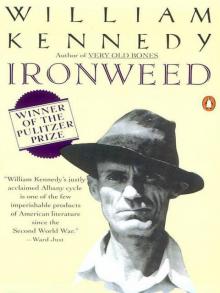 Ironweed
Ironweed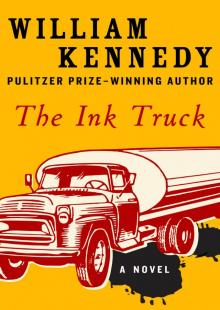 The Ink Truck
The Ink Truck Billy Phelan's Greatest Game
Billy Phelan's Greatest Game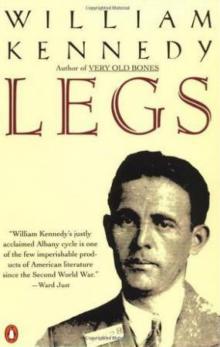 Legs
Legs Very Old Bones
Very Old Bones The Last Mission
The Last Mission The Flaming Corsage
The Flaming Corsage Roscoe
Roscoe Quinn's Book
Quinn's Book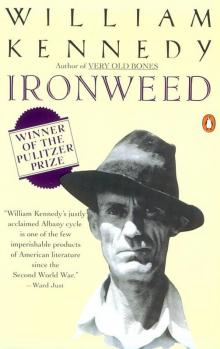 Ironweed (1984 Pulitzer Prize)
Ironweed (1984 Pulitzer Prize)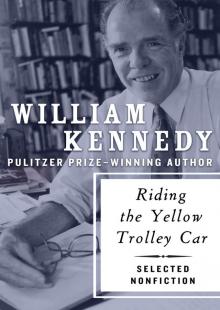 Riding the Yellow Trolley Car
Riding the Yellow Trolley Car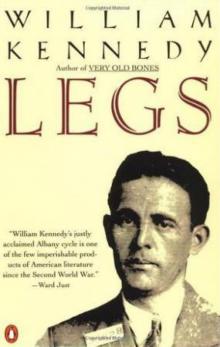 Legs - William Kennedy
Legs - William Kennedy